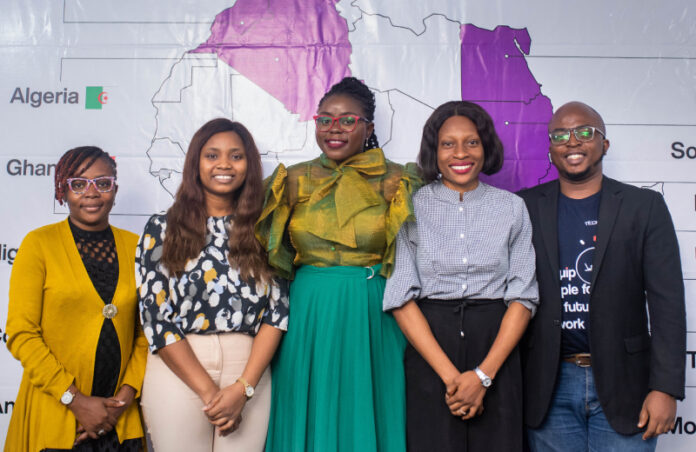The Need To Build The Future of Africa Through Technology, Innovation and Entrepreneurship

The challenges Africa face can only be solved by Africans. Every continent faces one challenge or the other but the difference between Africa and other continents is that Africa is yet to identify her strength, yet to create a strategy as to take up the responsibility of building her future rather than the over dependence on other continents. That is why Africa has largely remained poor even with her great human and natural resources.
We constantly need to remind ourselves that as Africa’s population is growing at a fast rate it becomes a greater challenge for the nations if something is not done to create wealth and provide jobs for young people in Africa. The changing dynamics in globalization and emerging technologies is moving at a great speed like never before. It becomes quite obvious that if urgent steps are not taken for Africa to become sustainable and take responsibility for her future, the continent will be in great crises in few years from now.
Technology, Innovation and Entrepreneurship are the keys to unlock Africa’s great potentials and the increasing population of young Africans are the drivers of this future. We are beginning to see increased attention of foreign investors into Africa who are willing to invest in African start-ups.
The 2017 World Economic Forum report on Africa’s potentials to compete globally shows positive indicators for hope and that more African countries like Mauritius, Rwanda, Kenya, Namibia, Burundi, Tanzania are beginning to attract more investments and are going in the right direction. The recently published Global Innovation Index (GII ) 2017 is a great resource for African countries, entrepreneurs and businesses to look at and know what others are doing and understand the need to invest in technology and innovation. The GII 2017 supports the fact that there is still hope for Africa if the right investments are made in technology, innovation and entrepreneurship.
The launch of dot Africa domain names offers great opportunity and increased attention to Africa. Its a great asset if leveraged well, that will bring positive attention to Africa and help build African brands and create collective wealth and prosperity through Africapitalism just as Tony Elumelu has rightly envisioned.
With Emerging Technologies like Virtual Reality, Artificial Intelligence, Robotics, Genomic, Internet of Things, increased awareness on crytocurrency etc., it is obvious that the next 20 years within the Forth Industrial revolution will create a whole new economy and great industries which is so evident in what great innovators and game changers like Elon Musk ,Mark Zuckerberg,Jeff Bezos are investing in, rightly shows where the world is heading to with technology and innovation.Mark Zuckerberg, the founder of Facebook is investing heaviliy on Virtual Reality and Cell Mapping.Elon Musk is changing transportation both on land and in space with Tesla,SpaceX and the Hyperloop.He is also interested in Artificial intelligence through the neural lace technologies.
Africa’s hope for a future will be realized if the growing young Africans embrace technology, innovation and entrepreneurship like never before with a focus to build Africa’s future. A collaborative effort from the governments in Africa, an academic community that is focused more on Innovation, entrepreneurship development through strong research, development and commercialization of products, increased number of science, technology, engineering, physics and maths graduates all around the continent, a strong private sector that understands their role in start-up development, successful and influential entrepreneurs from Africa( as ambassadors ) who will support, encourage and mentor young entrepreneurs and also the need to celebrate successful start-ups are all ways of a possible future for Africa.
Understanding the dynamics of Start-up development and Creating a path for Africa
There are several key market areas that African Startups can focus on, I see great opportunities around EduTech, HealthTech, FinTech, Agro-tech, Power, Renewable Energy and many more. Everyone who is keen to play a role in Start-up development in Africa(the Government, the private sector, academics, the entrepreneurs themselves) should first understand the dynamics of start-up development around the world today. There is a need to understand what type of start-ups Africa need to focus on at this time and how to channel the needed support towards such. Steve Blank in one of his articles: Why Governments Don’t Get Startups, gives a clear distinctions on this subject. Steve identified six types of Startups: Lifestyle start-ups, small business start-ups, scalable startups, buyable startups, large company start-ups or social start-ups.Understanding this will help form the base upon which to build
Building Innovation Culture and Ecosystem
Innovation is the soul of successful Start-ups. An Innovation culture is the platform that drives entrepreneurship and makes the creation of successful Start-ups more predictable in a given ecosystem. Two different innovation cultures that am looking at closely and I think Africa needs to learn from is the Silicon Valley innovation culture and the Israel( Start-Up Nation) innovation ecosystem. These two top innovation cultures are different and operate with different challenges but they surely have unique similarities, they have built a strong collaborative effort of the Government, the academic community and a private sector to form a solid and formidable triangle of innovation culture that produces more successes. This innovation culture can be replicated in Africa with key uniqueness of Africa in focus. Each of these key players in the innovation triangle has to play their part to make things work in that system.
First the government creates the enabling environment, stimulates growth, guides, regulates and sustains the innovation ecosystem. So for any innovation ecosystem to thrive government plays the leading role in its success. African government should understand their role in building an innovation culture that will produce successful startups that can compete globally. Some of the role of Africa government should include and not limited to: Understanding the types of startups needed in Africa as I pointed out above, being aware of its role and playing it well, having policies that favor and support entrepreneurship and startup development, establishing an office that oversees start-up development, starting initiatives and programs that provide early stage funding for start-ups, increased funding for research and development, encouraging the learning of science, technology, engineering, maths and physics related courses as to produce more graduates from these fields, building the needed infrastructure (like the internet, Electricity, Innovation clusters),Helping in the development of private sector venture capital market, willing to learn key lessons and also collaborate with countries that have built successful businesses and Startups.
Africa has many academic institutions which shows a great desire for learning and education, Nigeria for example has about 147 universities not including Polytechnics and Colleges of Education. But what is seen in the African education sector is a weak education system. This weak education system has contributed greatly to why Africa is still not innovating and underdeveloped. Building a strong educational system across Africa is a challenge for African leaders and educators. A strong academic community in an innovation ecosystem drives research, development and commercialization of ideas that form great businesses, the academics should be the ones to advice the government and private sector on how innovation cultures are built. Stanford University for example played leading role in the creation of Silicon Valley. The story of Israel’s innovation culture is never complete without mentioning the role Israel Institute of Technology-Technion plays.
The private sector on its own hand should be well organized, develop great workforce, have great ideas and willing to collaborate with the government and the academic community to build innovation clusters for several businesses within the African nations. The private sector should also see itself taking the lead in venture capital, Angel investment and public funding for startups, this will determine the growth of the ecosystem. Successful businesses and entrepreneurs from Africa should help in creating this innovation culture for startups to thrive and also serve as mentors for young businesses. Building a great innovation culture in Africa will make it easier to seek a focused collaboration within and outside the continent.
The need for more Innovators through STEM cannot be over emphasized
The stage Africa’s development is at the moment is such that we need to increase emphases and awareness on the study of Sciences, Technology, Engineering, Maths,(STEM)and physics as to produce thinkers and innovators that will change the continent with their inventions. Tuition to study STEM courses should be subsidized, scholarship should also be provided for students to study. More women should be encouraged in these fields to also become start-up founders.
And Building Strong Venture Capital System in Africa is imperative
Every idea is a potential business. Funding is needed at every stage of start-up development. Entrepreneurs in Africa find it very difficult to access funds for their business. It’s not that Africa is poor, it’s because there is no structured system that focuses on granting seed funds to budding start-ups. Every stages of viable start-ups should not have problems accessing fund for their growth. The future of African startups will largely depend on how easy it is for anyone who has a great idea to access the needed funds. African nations need to build strong venture funds and attract venture capitals from all over the world. The government, and the private sectors in Africa should collaborate and build a strong network of venture capital system.







